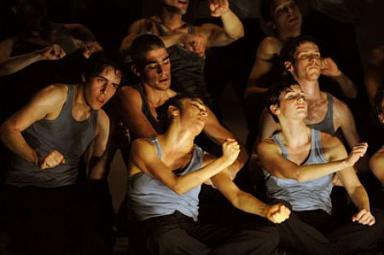Proposed Batsheva Boycott Sparks Debate

A call to boycott the upcoming Vancouver performances by the Israeli-based "Batsheva Dance Company":http://www.batsheva.co.il/ has sparked a flurry of discussion in the city's arts and dance communities. The performances, scheduled for February 20 and 21 at the Vancouver Playhouse, are a co-production of DanceHouse, the "Chutzpah! Festival":http://www.chutzpahfestival.com/dance.html#2 and the Vancouver 2010 Cultural Olympiad.
On January 29, Vancouver-based visual and video artist jamie griffiths emailed DanceHouse producers Barb Clausen and Jim Smith (with a copy sent to key members of the arts community) stating that she would be boycotting the Batsheva performances. In the email, griffiths states: “under the present political circumstances it would be impossible to enjoy such an event. I prefer to add my own artist’s voice to the many others that are calling for a boycott of Israeli cultural events due to the illegal military and civil actions occurring at this time in Israel.”
griffith's first visit to Israel was in 1999, when she accompanied Joan Jett and the Blackhearts as a videographer on a USO military entertainment trip. Since then, she has been to the region several times, researching both sides of the Palestine-Israeli conflict out of, as she puts it, “a desire to better understand the situation”. However, it was the recent conflict in Gaza that was the determining factor in her decision to no longer remain neutral on the subject.
“There have already been boycotts in London in the UK,” explains griffths, “and I found out later that many boycotts are already planned in other cities on Batsheva's North American tour. If there was not a boycott in Vancouver, we would be the exception rather than the norm. I felt it was my place to contribute to this discussion and raise the debate [and] publicize this issue.”
The issue has been widely discussed in the arts community, with stern emails being exchanged over the course of the past three weeks. Perhaps the most contentious issue is whether an artist or arts company in receipt of government funding should in some manner be held accountable for that government's actions. If when a company such as Batsheva is on tour and in receipt of state support, do they act as a form of cultural ambassador not just for the country in question but for the government in power. Supporters of this argument point out that Batsheva's current tour is part of the celebrations marking the 60th anniversary of the creation of the state of Israel. As griffiths states, “I find it highly unbelievable that if Batsheva were to create work that was critical of Israel that they would continue to receive their extra funding from the government. Our own government has already cut funding to its own touring arts programs. Arts funding is political.”
The argument against this point of view is that artists and companies in desperate need of funding should not be held responsible for the actions of their government, and accepting public funding does not ultimately represent support for a particular government's policies or actions.
This is the argument made by the Vancouver-based lighting designer Itai Erdal, himself a former resident of Israel. Erdal immigrated to Canada due to his “unwillingness to live in a country that has seemed to have lost its moral compass.” Although Erdal is supportive of boycotting Israel, he does not support boycotting its artists. In a recent email reply, Erdal states “You all know how hard it is to get funding as an artist in Canada, let me assure you that in a country that spends about 50% of its total budget on the military - it is a lot harder.”
Erdal goes on to suggest that most artists would likely accept controversial funding in order to make their art. As a lesser example, he points out that many Vancouver arts companies are apprehensive about public spending going towards the 2010 Olympics but are still willing to accept funds from VANOC, the organizing committee which also supports the Cultural Olympiad. “How many dancers in the Batsheva company feel exactly the same as me but they can't leave, they have to live in Israel and they just want to dance, do you really think that making them dance in front of a half empty house will help even one child in Gaza?”
In regards to Batsheva’s opinion on the Palestine-Israeli conflict, no one from the company was able to contact Plank Magazine before the posting of this article. However, in a recent interview with Vancouver’s "Georgia Straight":http://www.straight.com/article-200846/protests-dog-israeli-dance-company Batsheva’s Artistic Director Ohad Naharin states that he is critical of the violence in Israel but does not believe a boycott of their upcoming performance is the right path to action. Instead, he believes that artists are compassionate and can offer solutions to conflict.
This dilemma raises a lot of very difficult issues that Canadian artists themselves rarely have to confront. Do artists operate outside of the political arena? Do Canadian artists become de facto political representatives by accepting Canada Council grants? Should artists be held accountable for their government’s actions if they accept public funds? Should boycotts include arts and culture? Whether or not you will be attending one of this weekend’s performances, these are certainly questions that artists all over the world can and increasingly must consider.



